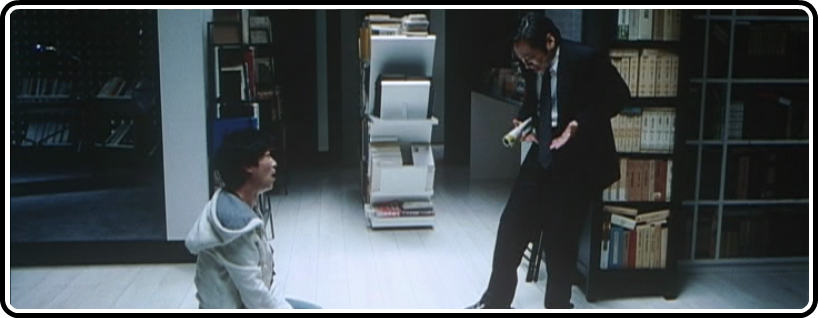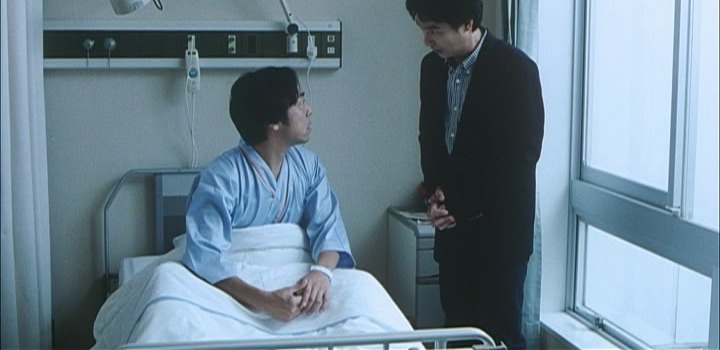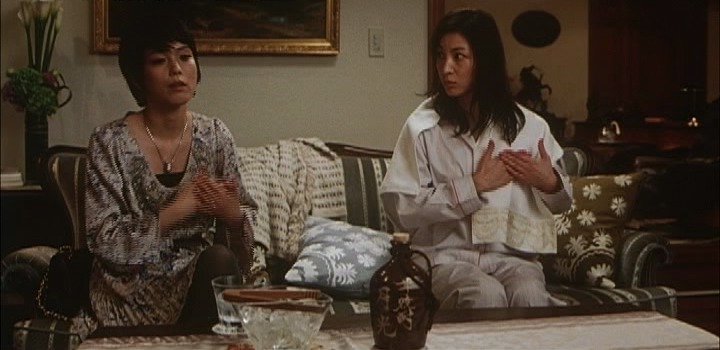
For well over a century now, narrative cinema has based much of its appeal on its ability to temporarily step into the lives of others, adding to the viewers’ experience by allowing us to briefly adopt the perspective of someone else. Key Of Life, a 2012 Japanese release that’s featured in this year’s Portland International Film Festival, kicks up that sense of virtuality to a new level in its funny and fascinating portrayal of two men suddenly thrust into each other’s station in life, then grappling with the unexpected consequences of the switch. The film belongs to that select sub-genre of comedy based on switched or mistaken identities – 1983’s Trading Places starring Dan Aykroyd and Eddie Murphy might be the most familiar example; at least that’s what came to my mind.

In Key Of Life, the lifestyle swap takes place between Sakurai, a struggling actor whose unshakable mediocrity has him contemplating suicide, and Kondo, an elite hit man who lives in luxury but is almost completely isolated from society due to the secrecy he must maintain in order to do business. A random accident in a bathhouse lands Kondo in the hospital with persistent amnesia and, by a fluke exchange of locker keys and the identifying documents and personal items found in them, gives Sakurai a no-strings attached opportunity to escape the drudgery and indebtedness that’s left him so depressed. Each man’s relative anonymity provides the perfect cover for them to pick up where the other left off: the amnesiac is released from the hospital, trying to make sense of the chaos and confusion he discovers when he returns to his “home,” and the novice assassin-for-hire settles into his predecessor’s meticulously organized routine.
That summary alone offers a strong premise for comedic juxtaposition, as two conflicting personality styles struggle to fit into schemes quite unsuitable for their respective temperaments. But director Uchida isn’t content just to leave it at that, as he introduces a subtle satirical take on contemporary Japanese romance into the mix through the female character Kanae, a magazine editor whose hyper-organized, controlling personality rivals that of Kondo for overbearing attention to detail. She bookends the film, an interesting and subtle move on Uchida’s part, since the male leads tend to dominate the action otherwise. I think it’s quite smart of him to include this female perspective, as it rounds out the broad comedy of professional killer and stumblebum actor ineptly replacing each other with a more humane exploration of that relentless tendency so many of us struggle with to somehow reach beyond ourselves, to create something “more” than the ordinary routines we’re used to… whether that’s through new intimate connections (Kanae’s search for a husband), financial stability (Sakurai’s obvious quest) or reconnecting with basic emotions like empathy and compassion (Kondo’s desire for social reintegration.)

But before I go totally off the rails with lofty philosophizing, let me just make clear how much fun I had watching and rewatching Key Of Life. It’s impossible not to laugh at Sakurai’s bumbling efforts to come across as a stone-cold badass when his professional services are once again demanded of him in a face-to-face encounter with the merciless client who has another job for him to execute. Just as amusingly absurd to behold are Kondo’s bewildered endurance as he assembles the scattered factoids of his life into something coherent and Kanae’s ultra-calculated sifting of suitable candidates for marriage.
Inevitably, the crossed-up identities have to be discovered, and that transition is just as successfully handled as Kondo comes to his senses and helps Sakurai wriggle his way out of the complicated mess that his ruse created. Revealing plot details from that point on would only ruin the surprises, but it’s sufficient to say that Key Of Life never runs out of steam, despite a two-hour plus running time that might seem a bit longer than necessary for most light comedies. I guess that’s Uchida’s way of indicating that he has his sights set a bit higher than routine disposable entertainment.
[youtube http://www.youtube.com/watch?v=In4BnAsQDQc?rel=0]
After spending quite a few evenings over the past several years watching older Japanese films, I enjoyed the chance to see something new from one of that nation’s promising young directors. In its combination of romantic whimsy and pointed commentary on contemporary Japan, Key Of Life struck me as something along the lines of a fifty-years-on successor to Koreyoshi Kurahara’s I Hate But Love. Who knows if it will garner a wider distribution or eventual home video release here in the States? I hope it does – it clearly deserves to be seen and appreciated by a global audience.
PIFF 36 Link: Key Of Life will be shown at the Regal Lloyd Center 4 on Wednesday, Feb. 20 (8:45 p.m.) Details and more information on the film can be found here.
Full Schedule for the 2013 Portland International Film Festival



![Bergman Island (The Criterion Collection) [Blu-ray]](https://criterioncast.com/wp-content/uploads/2022/11/bergman-island-the-criterion-collection-blu-ray-400x496.jpg)
![This Is Not a Burial, It’s a Resurrection (The Criterion Collection) [Blu-ray]](https://criterioncast.com/wp-content/uploads/2022/11/this-is-not-a-burial-its-a-resurrection-the-criterion-collection-blu-ray-400x496.jpg)
![Lars von Trier's Europe Trilogy (The Criterion Collection) [The Element of Crime/Epidemic/Europa] [Blu-ray]](https://criterioncast.com/wp-content/uploads/2022/11/lars-von-triers-europe-trilogy-the-criterion-collection-the-element-of-400x496.jpg)
![Imitation of Life (The Criterion Collection) [Blu-ray]](https://criterioncast.com/wp-content/uploads/2022/11/imitation-of-life-the-criterion-collection-blu-ray-400x496.jpg)
![The Adventures of Baron Munchausen (The Criterion Collection) [4K UHD]](https://criterioncast.com/wp-content/uploads/2022/11/the-adventures-of-baron-munchausen-the-criterion-collection-4k-uhd-400x496.jpg)
![Cooley High [Criterion Collection] [Blu-ray] [1975]](https://criterioncast.com/wp-content/uploads/2022/11/cooley-high-criterion-collection-blu-ray-1975-400x496.jpg)